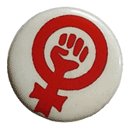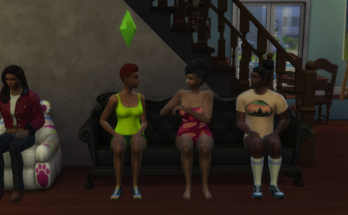I’m back from Colby College in Maine which also signals the almost-end to the six-month experiment I’ve been running here, and at real places across the country (Concordia in Montreal, UCLA, Rutgers in NJ, Yale in CT, Occidental in CA, Re:Humanities in PA, Feminist Documentary at Smith in MA , and Colby) as I attempt to use this Online Space to enact and hold a set of media objects and circular–Call and Response and Call Again–movements that propel feminists from:
- Reception to Production
- Commenting to Connection
- Production to Collaboration
- and the Internet to the Real World (and back again)
The successes seem notable: the primary being the palpable sense of excitement, shock, playfulness, worry, and community that was produced in each and every place on my road trip when I unmade protocol by asking audience members to respond to my scholarly talk by making something quick and rudimentary that would last, that would become public, that would leave their place and sit on mine, that represented each one of them and their place and their ideas about feminism and place, and that would give them each some small piece of authorial control in a situation not typically structured to do so. Make they did, and many of the objects were quite extraordinary (especially given how quickly they were made), and all of them were generous and generative.
My main goal, however–again, I think successfully played out–was less things than process based: not to acquire the objects and more to turn the room into something holding interactions akin to those of the Internet, and then allowing the felt experience of this altered interaction to shed light on the different ways we form community and connection in live, digital, and their linked places.
But lots of this didn’t work so well, too, in ways that were informative. First off, there was a structuring power imbalance between me, the outsider (with the website, and the plane ticket and speaker’s stipend, and the carefully crafted and long talk) and the placed audience (who freely gave up their words but with only five minutes to author their ideas) that most closely mirrors the imbalance of (corporate) websites. The impulse or call was mine and my feminist audiences playfully or politely responded. For the most part, they then produced the expendable, one-off objects that define most of our interactions online, albeit, in this case, more focused on one sustained question and politics.
This led me to try to imagine how I might enable more careful, and communal, interaction and towards this I began collaborating with some of the people I had met along the way, most critically with Wendy Hsu and Carey Sargent (Grapefruit Experiment), who I met at Occidental College, where they are post-docs in the Digital Humanities. I invited them to remix something from the Gallery of audience-made objects, which led to the “But I Like Kittens Remix,” and I then connected them to Marty Fink, at Concordia, who worked with them, and others from her local community, to make the song’s cover art.
Then, when I went to the Tri-College Digital Humanities Conference and to Women, Social Justice and Documentary at Smith, I tried to more strongly focus community response towards building something together, and requested that people provide sounds that would be used in a song made again by Grapefruit Experiment. From this was made Kong Jian. At Colby, we asked for cover art, and got great stuff again.
Needless to say, while I love all the things people made, and even the process(es), I learned that the ownership, structure, impulse, and infrastructure, while certainly dispersed, stays locked or perhaps laced to me: the instigator and authority. While I am aware that seeds have been planted in many places by using the road, and planes, and rooms, and from those many theres, people will take these ideas and use them as they will, I am still interested in thinking about the best uses of on and offline spaces for making production, connection, collaboration and community, something yet unrealized (by me, here).




One Comment on “The Road Trip Experiment”
Comments are closed.